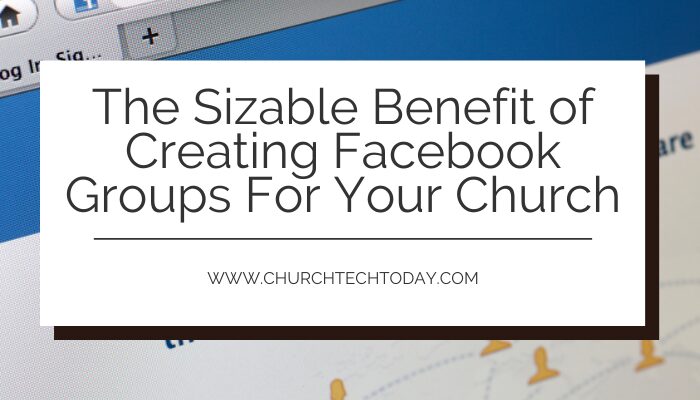Is your church utilizing Facebook Groups? It's easy to overlook the benefit of Facebook Groups for churches, but I'm here to tell you it's a tool that you don't want to neglect. In this article, we'll talk about the sizable benefits a Facebook Group can have on your church, and I'll walk you through 4 helpful steps to create a group today.
Most churches now have a Facebook Page, but most are still struggling to learn how to use Facebook Groups effectively. As a result, churches are missing out on a simple and powerful tool to connect with and communicate with their congregation.
If you are interested in using social media effectively, you need to consider adding at least one Facebook Group, and ideally more.
Nearly one-third of the world’s population has a Facebook account, and nearly eight out of ten Americans are active on Facebook. But many churches have learned that it has become increasingly more difficult to reach people using Facebook. Even if you have good content, it seems that many people never see your posts. The reason is that back in 2018, Facebook effectively changed how organizations and businesses use Facebook by changing their algorithm. Facebook de-emphasized posts from Facebook Pages and increased the visibility of posts from friends and Facebook Groups. So if you want more people to see your posts, Groups can help you accomplish that!
What is the difference between groups and pages?
First, we need to make sure that we understand the distinction between profiles, pages, and groups.
Your profile represents a real person, and you need a profile to use Facebook.
A Page represents a business, church, brand, public figure, or organization. A Page can be used to share public information about your church, and your page is controlled by Admins and Editors who have Facebook Profiles.
I do want to share a cautionary note: you need to make sure that every admin on your Facebook Page is a real person, and is not a generic login account for your church. Facebook has been proactive in disabling Pages that have fake user profiles since it goes against their terms of service.
Finally, Facebook Groups are a collection of profiles and pages that interact in the group community. A Page is focused on your church sharing information publicly, while a Group is focused on the interaction between the members.
What’s the difference between Facebook profiles, pages & groups? Profiles represent a real person. Pages represent a public entity: a church, business or brand. A Group is a collection of profiles & pages that interact as a… Click To TweetPossible Uses for Groups
Groups can be extremely effective in helping you build community within your church. Consider these uses to maximize the benefit of Facebook groups for your church:
- A Single Churchwide Facebook Group for Your Attendees – This can be used to stay connected throughout the week. You can create a safe place to share news, information, encouragement, and devotions throughout the week. And the best part is that your members are already on Facebook so they will stay connected.
- Multiple Smaller Groups for Your Church Ministries – Groups are a great way for your ministries to actually do ministry throughout the week. You can share updates, have conversations, and build relationships online.
- Private Hidden Groups for Your Leadership Teams – Groups work great to share prayer requests, do online meetings using video rooms, and to share documents with your leadership teams.
4 Helpful Steps to Start A Facebook Group For Your Church
1 – Choose A Public or Private Group
Will your group be public or private? This is an important choice because Facebook is currently in the midst of changing how Public Groups function. You can always change a public group to private, but you are not allowed to change a private group into a public group. So what is the difference?
There are 2 basic privacy settings for Facebook groups:
- Public: anyone on or off Facebook can see who’s in the group and what they post.
- Private: only members can see who’s in the group and what they post. A private group can also be hidden so that only people who are invited can find it.
So which type of group should a church use?
Private groups work great for ministry and leadership teams. You have the ability to control who interacts and posts, and people feel safer sharing in a private group. Our church has a hidden private group for our leadership team that we use for prayer requests, and to share important files for our team. Several of our ministries have Facebook groups where they can share updates and announcements, and then we have a churchwide group that we use to build community throughout the week.
If you have a churchwide Facebook Group, and I believe you should, you will have a decision to make. With the most recent changes to public Facebook Groups, anyone will be able to see all posts in the groups, and they can request to participate in the group. My personal recommendation is to use private groups for your church, even if you have a churchwide group. I feel that approving members of the group for a private group is easier than moderating spam and comments from people who want to create division in your public group.
2 – Decide on the Rules for Your Group
Facebook allows you to have membership questions for private groups, and participation questions for public groups. You can have up to three questions to help you get to know the people in your group, and you can also have group rules.
Since community-building is likely your intention, I encourage you to establish rules that facilitate good discussion. Your church leadership team will have to decide what is off-limits for the group, and your rules simplify the process of moderating comments and posts by giving you guidelines on what is appropriate.
3 – Promote Your Group
If you want your group to be successful, then you need to communicate why you are starting a new group, and invite people to join it. You can do this during your main services, through your social media accounts, through email blasts, and through personal invitations.
The Facebook algorithm prioritizes group posts that are active, and if people participate in the group as soon as they join, your posts will be more likely to show up in their feed.
Reach more people when you leverage Facebook ads for your church. Learn more at Facebook Ads for Churches.
4 – Start Posting
The great advantage of a Facebook group is that your church leadership does not have to do all the posting. In fact, a group works best when everyone helps by sharing within the group. If you have a churchwide group, all of your leaders can be involved and help post. Invite the group members to share as well. By letting them know that you want to create conversations and build relationships, you will start an online community that sustains itself.
Facebook has special post types that you can utilize like prompts, Q&A’s, prayer posts, live video and more, and all of these help engage people in community. You can view this past article to learn 6 ways that groups help your members interact online.
A churchwide Facebook group can become a type of online campus of your church, where discipleship happens throughout the week. People can encourage one another, and share what they are learning as they follow Christ together.
If you want to learn more about Facebook Groups, I have a paid online course, Facebook Groups Made Simple – A Complete Guide to Facebook Groups.




